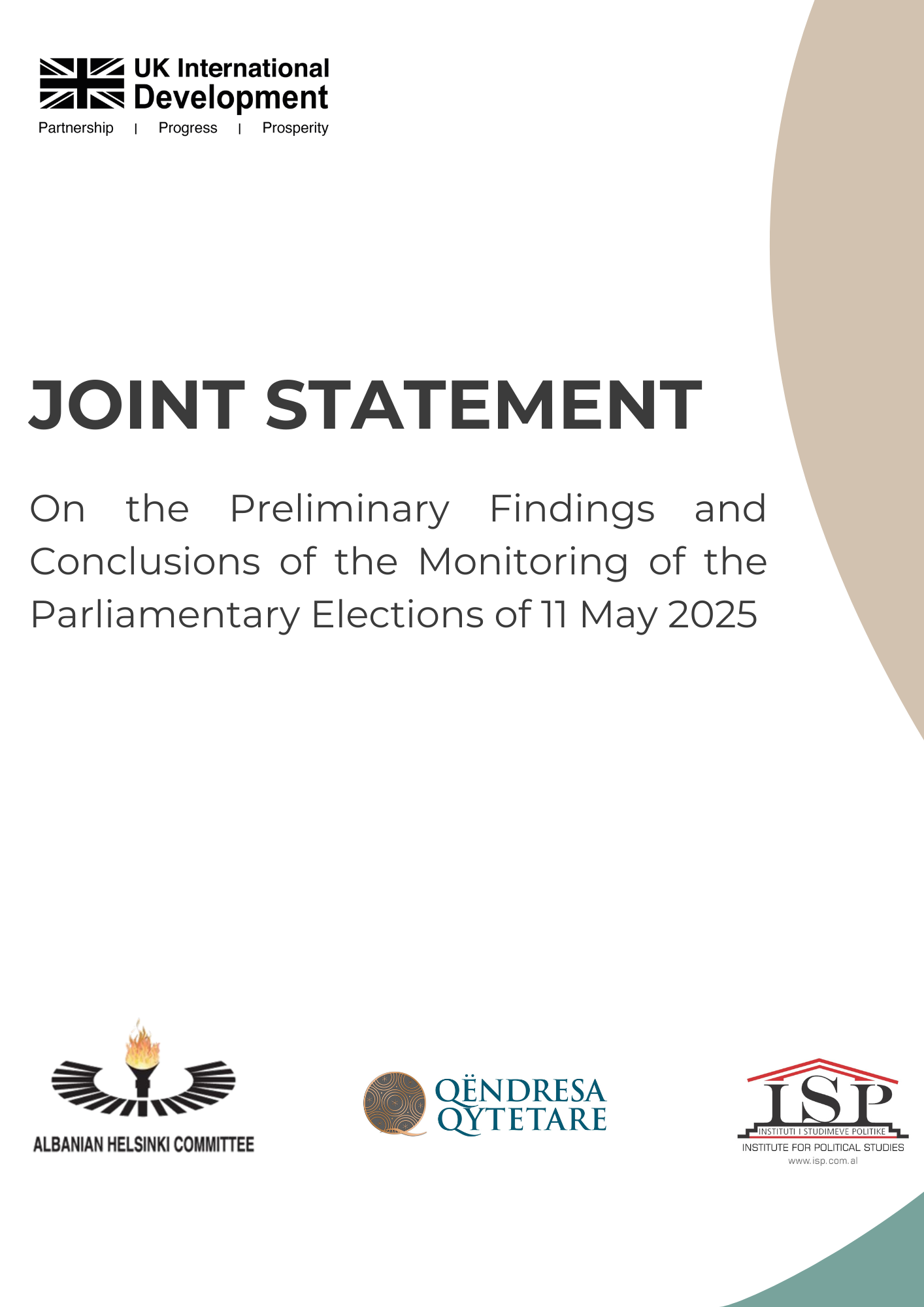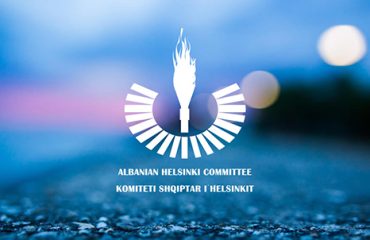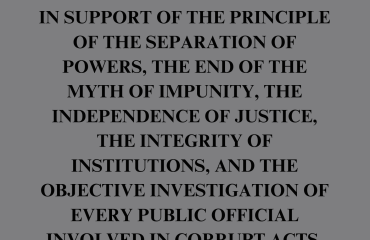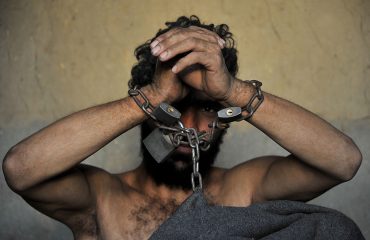With a team of 60 observers, AHC, CR, and IPS engaged in monitoring the pre-election process and the environment around this process, respect for electoral silence, the voting process, and partially the vote counting process.
During the voting process, observers from AHC and CR extended their monitoring over 163 Voting Centers in 17 municipalities of the country, and more concretely in Malësi e Madhe, Shkodër, Lezhë, Dibër Kukës, Elbasan, Tiranë, Durrës, Vlorë, Korçë, Fier, Lushnje, Berat, Gjirokaster, Fushë Krujë, Kurbin, Pogradec, as well as 3 special VCs located in the Institutions for the Execution of Penal Decisions. ISP engaged in monitoring media reports, statements and acts by the political parties/electoral subjects. Meanwhile, the process of the vote count has begun in 36 VCSs, which is ongoing.
The election day of May 11, 2025, displayed the same trend of some past elections in Albania, mainly a calm environment and participation of the active part of citizens, extensive media coverage, and extended presence of political parties and candidates, sensitizing messages for participation and active administration by the CEC on the problems that appeared. Elections are not one day; the electoral process is long and our organizations have taken several stances on issues encountered to date, including the joint statement on 11.01.2025 and 02.05.2025. Our final reports will contain positions and evaluations for all elements of the monitoring.
Meanwhile, our purpose is to express preliminary positions from the civil society standpoint regarding developments of the latest days of the process and the issues related with them.
● Electoral Silence
Observers encountered instances of not respecting electoral silence during the 24 hours that preceded the voting process, such as electoral posts on social networks by certain candidates, dissemination of propaganda materials in the public space with displays on billboards, and instances when electoral offices were kept open. The CEC should have reviewed within a reasonable time the denunciations submitted to it for violations of the electoral silence and, when appropriate, decide on administrative measures in keeping with article 174 of the Electoral Code.
During the exercise of the right to vote on voting day, in contravention with the requirements of electoral silence, representatives of political parties or candidates in these elections made statements that while they positively encouraged voter turnout in the elections, directly or indirectly, also contained political propaganda messaging.
● General Environment and Public Order
The general environment on voting day saw a few unnecessary incidents, which are more a reflection of tension, misunderstandings, and mistrust among the political sides. Unlike many of the previous elections, there were no serious incidents. Nevertheless, in some of the monitored VCs, the environment among commissioners and party observers was extremely polarized and led to strong debates, suspension of the process, or summons for the police forces. During the voting process, there was signaling by party observers, commissioners, and MPs for abuse and intimidation of voters, as were the cases noted in the Municipalities of Lushnje, Tirana (near Petro Nini School), Pogradec, Vora, etc. With regard to these cases, we saw a repetition of forms of reactions that include taking apriori police and justice functions by representatives of electoral subjects, which is unacceptable in the rule of law, but also in terms of messages for citizens, when they feel they are faced with an injustice. Taking into consideration the contestations by political actors for the engagement of structures of the State Police, it is our opinion that the prosecution office should have taken a proactive role in terms of the verification process and, if necessary, start investigations immediately. Furthermore, in all instances, for those involved – independently from their political status – there should be investigations and legal decision-making that is objective, independent, and that guarantees equality before the law without any distinction.
● Citizens’ awareness and voter turnout
Observers reported that for the most part, voters were not sensitized about their names on the list, on the manner of voting, on the ballot they should fill out, and casting it in the ballot box.
Data published by the CEC on voter turnout in these elections (42% of voters within the country) indicate a lower number of voters compared to the previous parliamentary elections of 2021. Although the political parties had the possibility to carry out a democratic and well-mannered electoral race, in fact, it was noticed that little room was devoted to the presentation of their platforms and novelties for voters. This campaign, both on audio-visual media and on social networks, was characterized by harsh denigrating language among political leaders and competing candidates, with elements of hatred. As a result, we judge that the campaign affected the worsening of the environment of mistrust of citizens in elections, political parties, and the right to vote.
● Voting process
Observers report that the process of the preparation and opening of the monitoring VCs was generally orderly, while there were issues in several aspects, such as lack of electricity, deficiencies in terms of the use and registration of the process by cameras, lack of commissioners, delays in opening VCs, absences among commissioners’ ranks, technical problems in the functioning of EIE.
Observers reported concrete cases of systemic problems of the electoral process, repeated also from past elections, such as in some cases family voting or failure to respect procedures to provide assistance to voters who could not vote on their own due to disabilities.
Furthermore, the media reported some instances referred by Commission members to police structures about photographing of the vote by voters, in contravention with article 109, paragraph 2, of the Electoral Code. Observers report that the Commissioners’ approach of not allowing voters to get into the voting booth with bags and mobile phones was not unified. Thus, for instance, at VC 1921/01 in Elbasan, there were discussions among commission members about suspicions of vote photographing, because only after the voter came out of the secret booth, it was noticed that the person had a purse.
Observers reported, though at a much lower degree compared to previous elections, technical problems with the functioning of the electronic identification equipment (EIE) or as a result of the equipment’s failure to recognize the voter’s identity, which then led to the voters’ sporadic departure, an influx of voters from the early hours of the morning, or continued slowing down of the process. Nevertheless, such problems were resolved thanks to the replacement of equipment or the restoration of the voter identification process from electronic to manual. Though sporadic, there were also problems with the cameras installed in the monitored VCs.
● Unauthorized persons and the conduct of party observers
We notice with concern that in some monitored VCs, we found presence of unauthorized individuals within the 150-m perimeter of the VC, inappropriate conduct with dictating elements and that create premises for intimidation of voters by party observers, as well as individuals who were outside the 150-m perimeter of the VC but systematically observed voters who entered and left the VC.
Party observers in VCs monitored in Durrës accompanied voters, provided to them instructions on how to vote and assumed the role of commission members in following voting procedures. In these VCs, observers noticed a high presence of individuals in the outer perimeter, near them, as well as unaccredited observers inside the perimeter. In one of the VCs of this city, observers also noticed the presence of an armed individual in the outer perimeter.
A presence of unauthorized individuals or party observers without accreditation badges was noticed also in other VCs. At VC 1135/00 in Dibra, the observer of the Socialist Party stayed, in contravention with the position of party observers in the VC, behind the VCC members to verify who voted. Two party observers of the same electoral subject were reported as holding lists identifying voters who had voted or not, and in some instances data was obtained in violation nof the electoral law and the one on the protection of personal data, by Commissioners themselves who communicated them the number of voters on the list or their names to the observers. In closing, we consider very disturbing the finding that often, party observers had continued cooperation with Commission members to check whether certain individuals went to vote or not. This form of “cooperation” that continues repeatedly, requires the addressing with priority of the need to depoliticize all bodies of the election administration.
● Access of observers
In general, the access of observers to the monitored VCs was complete. Nevertheless, there were some instances when they encountered obstacles, such as was the behavior of Commission members at VCs 1474 1474/1 1450 1448 in Durrës, where the AHC observer as well as other observers in these VCs were expelled and were not allowed to monitor the procedures for the closing of these VCs.
Observers were proactive in submitting reservations to the Commission members about serious violations of electoral legislation in the process for the administration of voting. The Civic Resistance submitted 4 written reservations while the Albanian Helsinki Committee submitted three written reservations.
Furthermore, our organizations alerted the Central Election Commission to separate or gropu violations.
● Monitoring of Institutions for the Execution of Penal Decisions
AHC observers monitored special VCs established in 3 IEPDs, precisely “Mine Peza” in Tirana (302), “Jordan Misja” in Tirana (313), and IEPD Durrës. In general, the voting process by citizens who were convicted and in pre-trial detention took place in an orderly manner and in a calm environment. At IEPD 313, there were complaints by convicts directed at the institution of the People’s Advocate, for the inability to exercise their right to vote by some citizens deprived of their liberty, due to the lack of identity cards. There were reports of sporadic cases of perceptions by Commissioners at IEPD 313 that convicts were heard instructing one another to vote well and carefully. At the VC of IEPD Durrës (in the premises of the institution’s mosque), observers encountered overcrowding in the corridor leading to this VC, which created the premises for convicts to influence one another while conversing.
● Vote Court
After the conclusion of the voting process for the parliamentary elections, our observers continued the monitoring partially of the counting process at 36 VCSs, established at the buildings of the CEAZs, in 17 municipalities of the country, precisely in Malësi e Madhe, Shkodra, Lezha, Dibra Kukës, Elbasan, Tirana, Durrës, Vlora, Korça, Fier, Lushnje, Berat, Gjirokastra, Fushë Krujë, Kurbin, and Pogradec.
In general, the vote counting process displayed issues that were repeated, such as sporadic cases of debates among candidates, party observers, vote counters, and replacements of the latter.
The phenomenon of training members of the Vote Counting Groups just before the process begins continues to remain disturbing: such a situation creates considerable delays in publishing the results of the voting process. Moreover, we express concern about the effectiveness of the technical aspects of the closing of the voting process: in a considerable number of cases, the lack of the Process-Verbals of the Opening and the Closing of the Voting caused obstacles in finding these documents in the boxes of voting materials by the VCGs, which led to other delays in staring the vote counting process.
Though rare, we encountered also cases where members of the VCGs were replaced immediately before the start of the vote counting process.
● Criminal acts that affect free elections and the democratic system of elections
As in the past, denunciations about vote-buying and selling continued in the late hours of the night, a few hours before the voting process began, in the Municipalities of Dibra and Mirdita. The solemn engagement of the chairs of the parties, according to article 64 of the Electoral Code, remains formal and vote buing and selling remains a phenomenon that is not condemned seriously by them.
Until May 9, 2025, according to official releases, it appears that 54 criminal referrals were submitted to the prosecution offices of general jurisdiction, of which 23 moved on to the investigation phase, registered as criminal proceedings. These criminal referrals appear to have come: 27 from the State Police, 9 from SPAK, 7 from political subjects, 2 from citizens, and 9 cases upon initiative of the prosecution office.
Until May 8, 2025, the Special Prosecution announced that it had administered 123 criminal referral materials, where 35 of them have moved on to the investigation phase, registered as criminal proceedings. Of the prosecuted cases, it appears that 20 were initiated upon referrals by the State Police, 8 were initiated by the initiative of SPAK, and only 3 came as a result of referrals by different citizens.
Although we lauded the establishment of the Task Force by SPAK, the creation of the online portal for denunciations by SPAK, and the establishment of a green line for free phone calls on electoral crimes on election day, as positive, again we notice that the number of denunciations by citizens continues to remain very low. Furthermore, we consider that based on the circumstances that keep many citizens from denouncing (fear of revenge or victimization), the proactivity of the prosecution body in starting cases upon its own initiative should have been higher, considering also earlier communications that the electoral campaign was being monitored in the field. Overall, we view as a positive development from a statistical standpoint the growing trend of criminal referral materials to both prosecution levels (those of judicial districts and SPAK). Meanwhile, from a quality standpoint, the decision-making of prosecution offices will be the subject of special analysis going forward.
We consider that only thanks to proactive, complete, comprehensive, objective and not selective investigations, conducted quickly on time, regarding quick procedural actions, will criminal acts affecting elections and the democratic system of elections be investigated and punished in an effective manner, thus contributing to their special and general prevention.
The monitoring of these elections is being conducted in the context of the initiative “Building electoral integrity and sustainability of political parties: Increasing the oversight role and demands of citizens through support for CSOs, media, and academia,” supported financially by the British Embassy in Tirana. This initiative is being implemented by a consortium of local organizations, Albanian Helsinki Committee, Institute of Political Studies, Civic Resistance, and BIRN Albania.
The findings and conclusions reflected in this statement are the sole responsibility of the signatory organizations and do not necessarily reflect the opininos and views of the British Embassy in Tirana.






